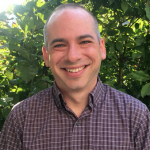The Departments of Allied Health Sciences (DAHS) Office of Research and Scholarship and Neurology have announced awardees of the 2019-2020 Sleep Innovative Research Grants (SIRG). The SIRG program launched in 2018 thanks to the generosity of the Eddie and Jo Allison Smith Family Foundation; the program leads an effort to build an internationally recognized program of research in sleep science at UNC-Chapel Hill.
This year’s awardees are:
- Paul Geiger, a postdoctoral fellow at the Center for Women’s Mood Disorders through UNC Department of Psychiatry, will lead the study “Relationships among Estradiol Variability, Endocrine Circadian Rhythms, and Sleep Problems in the Menopause Transition (MT).” Geiger’s study will provide mechanistic insight into hormone-related changes in sleep quality for women in midlife. “Improving our understanding of mechanisms related to sleep problems in aging women is essential for future treatment development and intervention. As the number of women traversing this transition continues to grow due to an aging population, understanding the cause of sleep problems has tremendous significance to public health,” Geiger said.
Research team: Paul Geiger, PhD; Susan Girdler, PhD, Department of Psychiatry; and Heidi Roth, MD, Department of Neurology and co-director of UNC Sleep Disorders Center.
- Michael Sidorov, a postdoctoral fellow in the Department of Cell Biology and Physiology, will head “Quantifying Sleep Spindles from Overnight EEGs as an Angelman Syndrome Biomarker.” Previous research from the group found sleep spindles as a promising biomarker of Angelman syndrome (AS), a neurodevelopmental disorder associated with cognitive impairment, motor dysfunction, epilepsy, and severe sleep disruptions. Over 90 percent of individuals with AS have impaired sleep, and this is major burden for caregivers. Sidorov said the completion of their study aims to quantify a biomarker that is biologically based and linked to sleep dysfunction. “We anticipate that sleep spindles may be used as an outcome measure for upcoming clinical trials where sleep quality is a primary endpoint,” he said.
Research team: Michael Sidorov, PhD; Ben Philpot, PhD, Department of Cell Biology and Physiology; Zheng Fan, MD, Department of Neurology.
- Marcia Van Riper, with the UNC School of Nursing, will lead a study titled “Family Management of Sleep Problems in Children with Down Syndrome.” Using a mixed-methods approach, her research group will work to identify key modifiable sleep and family management variables to be incorporated into an intervention to strengthen caregiver and family capacity to address sleep problems among children with Down syndrome. “Children with Down syndrome (DS) have a high prevalence of sleep problems and these problems can have long-term negative consequences for not only the child, but other family members, especially the child’s primary caregiver,” Van Riper said. The group will study families of children with Down syndrome through examining relationships among the child’s health status, family resources, family environment, health care system, family management processes, and overall health, sleep problems, adaptive behavior and health-related quality of life.
Research team: Marcia Van Riper, PhD, RN, FAAN; Kathleen Knafl, PhD; George Knafl, PhD, and Louise Fleming, PhD, RN, all of whom represent the UNC School of Nursing; Mary Ellen Wells, PhD, and Clare Harrop, PhD, from the DAHS; and Heather Hazlett, PhD, Department of Psychiatry.
Continuing through 2021, the competitive award process will offer three grants annually to UNC-CH investigators. For each round of funding, research teams will be funded up to a maximum of $10,000 for their one-year projects.
Grant reviewers brought wide-ranging expertise to the applicant pool of cross-disciplinary submissions. They included:
- Aysenil Belger, PhD, Department of Psychiatry
- Gabriel Dichter, PhD, Department of Psychiatry
- Bradley Vaughn, MD, Department of Neurology
- Amelia Drake, MD, FACS
- Linda Watson, EdD, Division of Speech and Hearing Sciences, DAHS
The 2020 application cycle begins in October 2019, with applications due in March 2020. The next round of pilot grant funding will coincide with the launch of a sleep science research symposium on October 14. This is an initiative alongside the Neurodiagnostics and Sleep Science (NDSS) program, the Department of Neurology and the University’s Office of Research Development. The NDSS program is a joint initiative between the DAHS and UNC-Charlotte.
“The consortium makes sense as the next logical step to bring the UNC-CH sleep research community under the same tent,” said Stephen Hooper, associate dean and chair of the DAHS. “The pilot grants have served as a great way to promote collaboration for those on our campus with similar research interests.” There are more than 200 faculty at the University who have conducted sleep-related research.
The DAHS launched a quarterly series of sleep forums in 2018, with sessions featuring sleep labs and tools available to researchers on campus. In fall 2019, the sleep forums will continue with an interactive talk on pediatric sleep and cognition, and the way in which they are altered in neurodevelopmental and neuropsychiatric disorders.
“Sleep science is a research field that impacts all populations and has major implications for quality of life,” said Brad Vaughn, medical director of the sleep science bachelor’s program. “The pilot grant program has been successful in bringing together cross-disciplinary researchers, some of whom have formed collaborations to seek larger-scale funding support. Our sleep consortium will strengthen the University’s sleep science research network by bringing researchers who already excel in their respective areas together to foster innovation. We are grateful to the Smith Family Foundation for their generous support.”
For more information, contact Elizabeth Crais, PhD and DAHS Associate Chair for Research, at betsy_crais@med.unc.edu.



